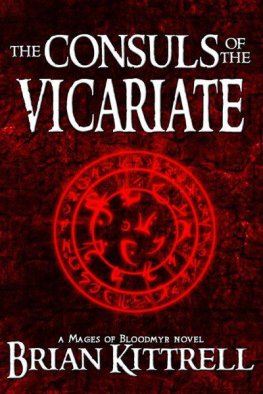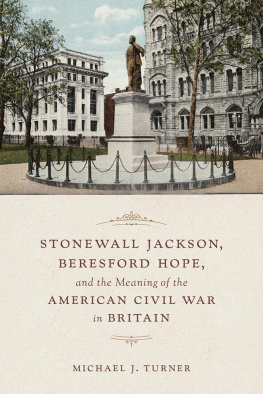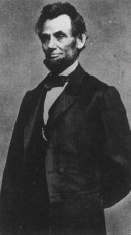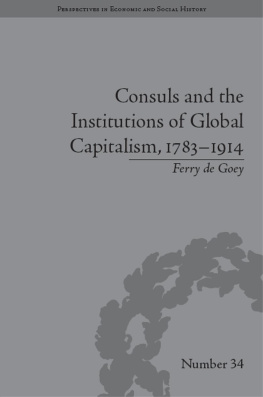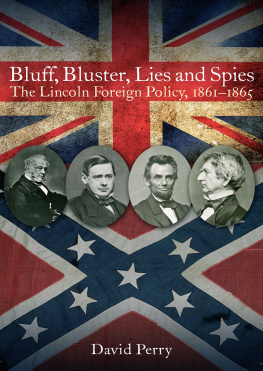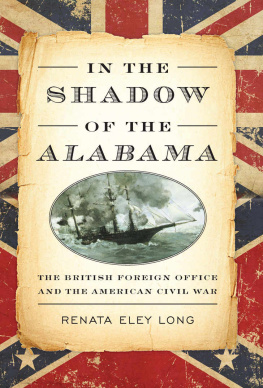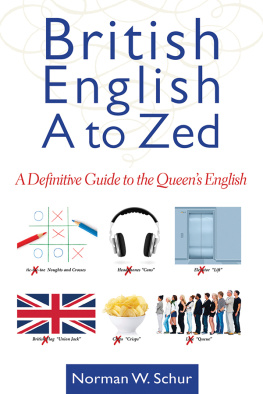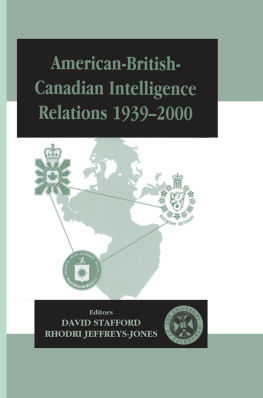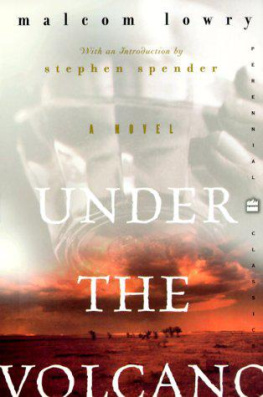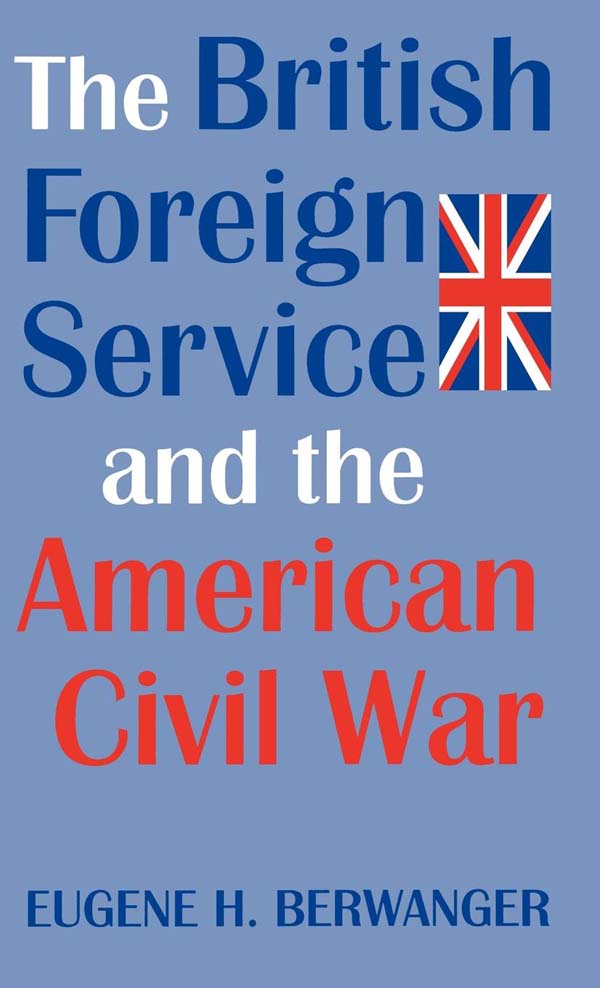The British Foreign Service
and the American Civil War
THE British Foreign Service
AND THE
American Civil War
EUGENE H. BERWANGER

Copyright 1994 by The University Press of Kentucky
Scholarly publisher for the Commonwealth,
serving Bellarmine College, Berea College, Centre
College of Kentucky, Eastern Kentucky University,
The Filson Club, Georgetown College, Kentucky
Historical Society, Kentucky State University,
Morehead State University, Murray State University,
Northern Kentucky University, Transylvania University,
University of Kentucky, University of Louisville,
and Western Kentucky University.
Editorial and Sales Offices: Lexington, Kentucky 40508-4008
Library of Congress Cataloging-in-Publication Data
Berwanger, Eugene H.
The British Foreign Service and the American Civil War / Eugene H.
Berwanger.
p. cm.
Includes bibliographical references and index.
ISBN 0-8131-1876-X (acid-free)
1. United StatesForeign relations1861-1865. 2. Diplomatic and
consular service, BritishUnited StatesHistory19th century.
3. Diplomatic and consular service. BritishConfederate States of
America. 4. United StatesForeign relationsGreat Britain.
5. Great BritainForeign relationsUnited States. I. Title.
E469.854 1994
973.721dc20 94-6468
This book is printed on acid-free recycled paper meeting
the requirements of the American National Standard
for Permanence of Paper for Printed Library Materials.

For Betsy as always
and to Anne and Tad,
with love
Contents
Preface
In this book I describe problems encountered by British consuls and the British legation during the American Civil War and attempt to determine their influence on the British Foreign Offices attitude and policies toward the crisis. My discussion is limited solely to issues within the Union and the Confederacy and does not cover such topics as the Trent affair, the building of Confederate raiders and Laird Rams in British shipyards, or other issues that at times put the Union and Britain on the brink of war. These topics have been thoroughly covered in such seminal works as Ephraim Adamss Great Britain and the American Civil War, published in 1924, and in many fine diplomatic studies and essays since.
I originally intended to study the consuls only, but investigating their problems made me aware of the vital role played by the legation in Washington. The consular and diplomatic corps were separate departments within the foreign service, but foreign ministers supervised the work of consuls and the two worked closely on issues of common concern.
My interest in this topic began when I read William Howard Russells diary, published in 1863. As special correspondent for the London Times during the first year of war, Russell traveled throughout the United States and remarked on the consuls and their problems in each major city he visited. He also made numerous references to Lord Lyons, British foreign minister to the United States. Investigation on my part revealed that very few historical studies had been done on the consuls or Lyons. Thomas Newtons two-volume biography of Lyons, written in 1913, devoted less than one hundred pages to the Civil War years and was based on limited sources and documentation. For the consuls there was only the work of Milledge Bonham Jr. on the British consuls in the Confederacy, written as a doctoral dissertation at Columbia University during the first decade of the twentieth century. Bonhams pioneering study was an excellent introduction but, like Newtons biography, it also was based on limited sources. Major collections including Lyonss papers, Foreign Office correspondence between the British legation and the consuls, as well as diplomatic correspondence between the U.S. State Department and the British legation was not available to the public before the First World War. Historians now have access to these materials and their availability opens the way for a more comprehensive investigation of British legation and consular problems with the Union and the Confederate governments.
I have broadened Bonhams study by including consuls in the North as well as the South, and this has given me opportunity to compare the similarity and intensity of their problems. The issues were comparable but established diplomatic relations between Great Britain and the Union eased their severity in the North and ultimately provided a means for easier solution, whereas the lack of any diplomatic channel in the South caused increasing resentment and bitterness toward Great Britain and its consuls.
I also attempt to reevaluate past impressions of consular attitudes, especially those of Robert Bunch, consul at Charleston. Bonham accepted the general belief of South Carolinians and the U.S. State Department that Bunch was pro-Confederate. However, Bunchs correspondencefound chiefly in Foreign Office records and the Lyons papersindicates the reverse was true. His attitude about the war, the South, and its leaders, expressed to his superiors at the legation in Washington and at the Foreign Office in London, was hardly pro-Southern.
I have been exceptionally fortunate in securing assistance from many individuals and institutions while undertaking my research. Grants from the American Philosophical Society, the National Endowment for the Humanities, and Colorado State University provided funds for travel to libraries and repositories in both the United States and the United Kingdom. Librarians at the Library of Congress, the National Archives in Washington, D.C., and at Duke University were helpful in locating materials and answering my many questions. Beverly D. Bishop at the Emory University Library; Charles Reeves, assistant director at the regional center of the National Archives at East Point, Georgia; and Michael Meier of the Military Records Division at the National Archives permitted me to photocopy a significant portion of the information I needed from their holdings and to study in leisure away from the archives. In England, Mrs. H.E. Jones, assistant keeper of the records in the Public Record Office at Kew, and Mrs. Patricia Gill, county archivist at the West Sussex Record Office, answered my many letters and aided me in numerous ways during my research trips to London and Chichester. The staffs at Kew and Chichester did much to help an uninitiated American become familiar with the English library system. Without the assistance of all of these individuals this book might never have been written. Extracts from the Lyons papers are reproduced with the permission of the Trustees of the Arundel Castle Archives, and with acknowledgment of the County Archivist, West Sussex Record Office.
Colleagues and friends also aided me by reading portions of the manuscript and offering suggestions for improvement. Professors Robert W. Johannsen of the University of Illinois, Urbana, and Mark T. Gilderhus at Colorado State University read an early draft of the entire manuscript and saved me from a number of mishaps. Carolyn Duff, a professional editor, made suggestions for organizational refinement that improved the book throughout. Interpretations found herein, however, are solely mine and I take full responsibility for them. John C. Inscoe, editor of the


